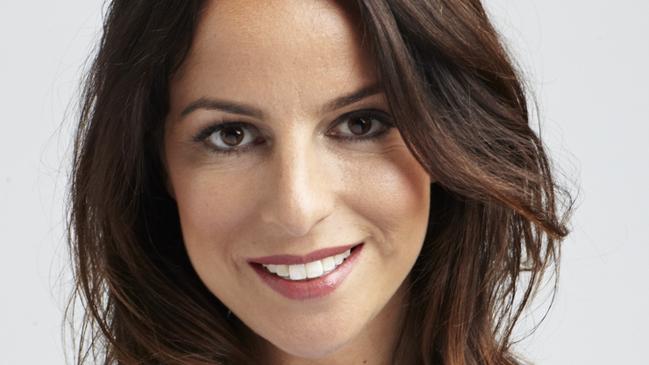Podcast: Sharri Markson defends ‘Bundle of Joyce’ scoop
Controversies have never been far behind Sharri Markson, the national political editor of Sydney’s Daily Telegraph | LISTEN

The conversation gets interesting when Sharri Markson, the 34-year-old national political editor of Sydney’s Daily Telegraph, turns her mind to sexism in Canberra.
“Sometimes politicians don’t want to have dinner with me just one on one in case someone sees us out and thinks that there’s something going on,” Markson tells The Australian’s Behind The Media podcast.
Are they frightened of Markson? “No, not frightened,” the thought amuses her. “That is how strong the rumour — vicious gossip thing — is in Canberra that they don’t want to be seen one on one. I’m sure it’s not just me. It’s any woman.
“Every night in Canberra I try to have dinner with a different political contact. So it’s very rare a politician will, a male, will be OK to just have dinner with me on their own. They’ll bring a colleague along. Which is kind of outrageous that we’re in that situation — where gossip is taken so out of control.”
In her time Markson has been chief of staff at The Sunday Telegraph, a senior producer at Seven News, editor of Cleo and media editor of The Australian. Controversies have never been far behind.
But her page one exclusive for The Daily Telegraph, revealing the deputy prime minister Barnaby Joyce was having a love child with former media adviser Vikki Campion (herself a former Telegraph journalist) took it to the next level.
Debate about the ethics of the story raged, although they have now died away and Joyce eventually quit. The front page photograph of the heavily pregnant Campion, accompanied by the headline “Bundle of Joyce” shocked some.
“Look there’s no question when I first saw the photograph and my editor (Chris Dore) as well — you feel a bit uncomfortable. It is an uncomfortable thing to take a photograph of a seven-month pregnant lady,” Markson tells the podcast.
“But the news isn’t always comfortable. That was a news photograph, it told the story and the story was in the public interest.”
“A lot of people” were chasing the Barnaby Joyce story, Markson says and she confirms that another News Corp photographer and journalist were trying to get the story for another platform in the group.
Markson had already taken heat for a previous front-pager in November, which obliquely referred to Joyce’s affair as a personal issue that was sending shockwaves through the government.
“(Nationals MP) Darren Chester said I needed to decide whether I wanted to be a gossip columnist or a press gallery journalist, which I thought was pretty outrageous. But that was the level of hostility towards that reporting.”
So how does Markson deal with the heat? “I’m used to it. I mean, I don’t mind a conflict situation as long as I know that what I’ve got is accurate and factual then I’m more than happy to defend it and go into battle.”
Relations with Joyce and Campion are non-existent. “I haven’t heard from them. I heard he’s pretty cross with me. One minister said to me he’d like to run me over — I am sure that he didn’t mean that literally.”
Some dismiss Markson as a political novice but she was previously in the Canberra press gallery for the Sunday Telegraph from 2007 to 2010 and also had two years at NSW State Parliament.
Markson refutes criticism about her youth. “Paul Kelly was a political editor at 25. I’m not comparing myself to him — he is far more brilliant than I could ever hope to be genuinely.”
But this isn’t the only scandal in Markson’s career. While at The Sunday Telegraph Markson had the distinction of being written up in London’s The Guardian newspaper after she interviewed without hospital permission an Australian survivor of the 2005 London 7/7 terrorist bombings. Markson explains she walked into the hospital dressed in her holiday sundress and wasn’t challenged.
“I didn’t lie, I was very careful, I just said ‘I’m here to visit John Tulloch’ and they said ‘oh he’s on whatever ward’ and I went up there. When I got in with him I gave him my card immediately and his wife was there as well. I’d bought a disposable camera which I used to take photographs so immediately I said to him ‘I’m an Australian journalist, are you happy to do an interview?’ And he was.
“People were unhappy that I didn’t play by the rules. But if I had stood outside (with) the rest of the pack I wouldn’t have got the interview.”
Stints at Seven News and Cleo magazine followed before she spent eighteen months as editor of The Australian’s media section alongside the then media business writer and current media editor Darren Davidson, who succeeded Markson.
“I’d come from this soft, fluffy environment into media editor of The Australian and we’re at war with the ABC.”
Does she think press gallery reporting can be too cosy? “Yeah in some ways it is,” she says, explaining that some reporters are reluctant to burn their contacts.
“Some people don’t want to delve into private lives. They see themselves as above that. They only want to talk about policy. Policy is important but so is a big scandal like this.”






To join the conversation, please log in. Don't have an account? Register
Join the conversation, you are commenting as Logout